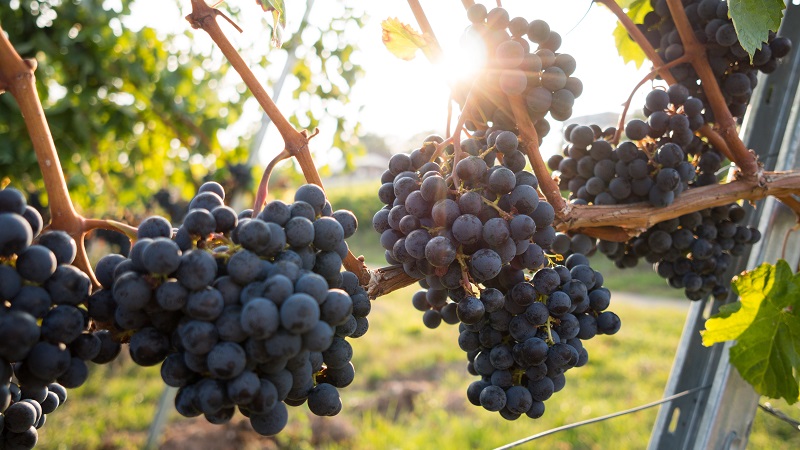Why Smoke Taint Is No Joke for Grape Growers

Smoke taint has increasingly become a problem for grape growers, especially in California and Australia, where wildfires have been prevalent. Parka, a product of Cultiva, has been shown to suppress smoke taint in wine grapes ― surprising even the manufacturer. Photo: Federal Emergency Management Agency
History is fraught with unintended discovery: Velcro, Play-Doh, Teflon, and Viagra are each attributed to serendipitous innovation.
The discoverer of penicillin left a dirty petri dish in the lab sink before going on vacation. Upon returning, he found the plate covered in bacteria ― except in an area where mold had formed.
And closer to home for fruit growers, Newton went on to establish his theory of gravity after watching an apple fall from a tree in his yard.
Today such happenstance may be dropping into the lap of Cultiva, a Las Vegas-based company that focuses on plant cuticle care. Its anchor product, Parka, has proven effective since being introduced in 2013. Growers have been applying the phospholipid spray to high-value crops to improve fruit quality and finish, suppress rain cracking, increase yield, and prolong shelf life.
“From rain cracking suppression on cherries to sunburn reduction on apples, Parka is a valuable tool that has helped growers increase their marketable yields,” Cultiva CEO Luis Hernandez says.
Outside the Box
Now, to the surprise of Hernandez, his product’s effectiveness has been determined to carry over into an off-label suppression of smoke taint in wine grapes. A study conducted by the University of British Columbia and published in the Journal of Agricultural and Food Chemistry concluded that the biofilm technology of Parka “significantly reduced” free and total volatile phenols (VPs) in treated grapes.
“We were not aware that they had been playing with this,” Hernandez says. “We were not aware of it up until last year, when researchers reached out to see if we wanted to collaborate on funds for the second year of trials. And that’s the way it is a lot of times with new applications for technology that has been developed, whether it’s with grower groups or researchers themselves. They’re the ones who think outside of the box.”
Although Hernandez has yet to receive a copy of UBC’s follow-up study, he has heard that, like the first trial, it favors the use of Parka. “Certainly, this is exciting for us to see,” he says.
Climate Change Issue
Smoke taint is a wine defect caused by wildfire smoke, which makes the issue especially relevant in the meccas of California (where the state’s seven largest fires in history have occurred since 2007) and Australia (where the ongoing 2019-20 bushfire season is infamously referred to as the “black summer”).
“Smoke taint is a problem and obviously is becoming a greater problem every year, with climate change,” Hernandez says. “This just further validates the value of our technology to help mitigate the physiological disorders that crops are seeing with climate change.
“Whether we’re talking about the fruit or the leaves themselves, we’re helping the plant increase the tolerance to climate change and to the stress that comes along with it,” he says “That’s certainly a focus for us as a company as we expand research and become the experts in cuticle care. That’s a key part of our mission.”
Parka 1, Other Sprays 0
The University of British Columbia team, in its initial study, assessed the Parka biofilm and two agricultural sprays that are approved to control powdery mildew. The goal was to determine each of their capacities to inhibit increases in VP concentrations in wine grapes following on-vine smoke exposure.
The results found that Parka’s artificial grape cuticle ― applied one week before exposure to simulated forest fire smoke (at one to two weeks after the onset of ripening) ― reduced levels of compounds responsible for smoke taint by 300% in smoke-exposed grapes at commercial maturity.
“This reduction in VP concentrations may mitigate crop losses experienced globally by the wine industry due to exposure of grapes on-vine (at key phenological stages) to wildfire smoke,” Lead Author Wesley Zandberg wrote.
Of the other two sprays, one was insignificant, and one intensified the smoke taint. “Ours was the only chemistry that yielded good results,” Hernandez says. “To my knowledge, I have not heard of anything else that has been tested against smoke taint or that growers have used in the past against smoke taint.”
Cultiva COO Sean Musser says continuing research is necessary to determine the right applications and timing to achieve best results. Adds Hernandez: “If there are wildfires this summer, growers can use Parka. The product is exempt from registration and tolerance, and grapes are already included in the label. We will be updating our recommendations specifically for wine grapes on Agrian.”










